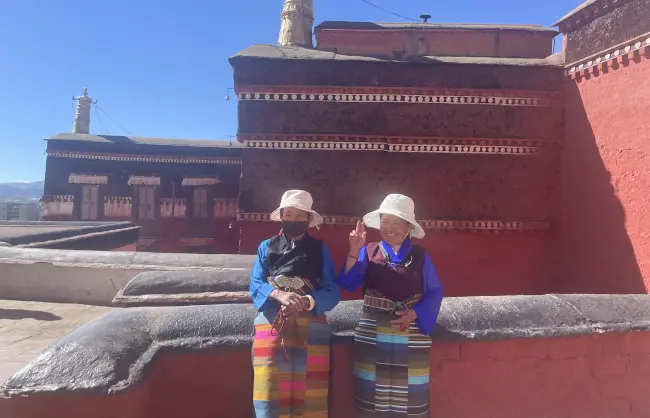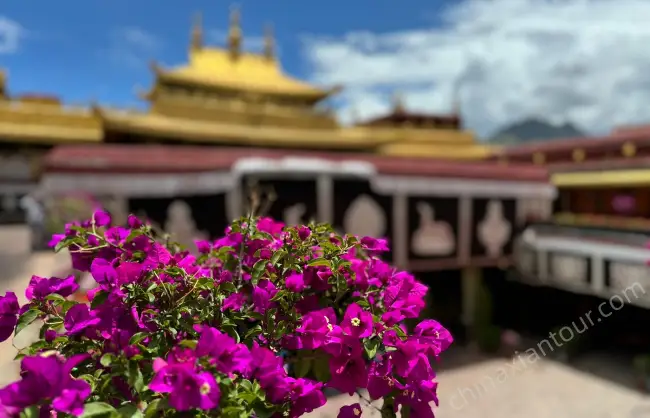The Tibetan culture is a unique culture different from other traditional Chinese culture to most visitors and the Tibetans have their own norms and traditional customs and taboos. In order to respect the Tibetans and not disrupt their lives too much tourists are advised to read up on the correct way to behave when visiting Tibet. Here are a few tips about the Tibetan customs including etiquette, values, taboos, and manners practiced in Tibet and how you can fit in.
Cultural concepts of time (is it rude to be late or early); personal space (what is an acceptable distance to stand from a stranger when talking to them); physical contact (is it acceptable to shake hands with a monk or a member of the opposite sex) and communication (is it acceptable to talk to strangers or ask personal questions) may be different to the norms you are used to. When you interact with locals in Tibet you want to create mutual respect and so it is important to know the Tibetan customs accepted norms of behavior in Tibet.
Tibetan Dress Code
According to the Tibetan customs, Tibetans usually dress quite conservatively compared to western attire, so when you travel in Tibet Region you should respect them by dressing accordingly. It is preferable to wear long skirts or long pants rather than short skirts or shorts. Wear shirts with sleeves rather than sleeveless or strapless tops. This is even more important when visiting religious sites.
Related reading: Tibetans Jewelry Customs: Why Do Tibetans Always Wear Rare Baldric

Photo Taking Based on Tibet Customs
In any country tourists should ask permission before snapping a shot of locals. Although most Tibetans don’t mind being photographed it is still polite to ask permission first.
Never take photos of locals who do not want to have their picture taken and never offer unsolicited money to locals in exchange for a photo.
Sometimes the locals will ask for money in exchange for the photo and in that case it is ok to give a little money or even better a small gift. Follow the local Tibetan customs, — in some places like Potala Palace, Jokhang Temple, other monasteries, military bases or sky burial sites it is forbidden to take photographs, please respect this.
✔Recommended Tibet Tours:
- 9 Days Tibet Tour with Everest and Namtso Lake
- 8 Days Lhasa to Everest Base Tour
- 6 Days Lhasa and Tsedang Tour
Dealing with Beggars in Tibet
You may have heard that giving money to people less fortunate is considered generous in Tibet and if locals are begging on the street it is acceptable practice to give them a few coins. Sometimes they are pilgrims who are financing their journey with charitable gifts. Tibetans consider it a good deed to help these people by giving them money or food.
In the larger cities you could find locals acting as monks or pilgrims just to get a few bucks out of the generous tourists. Also around popular attractions you’ll see “professional” beggars demanding money. Do not encourage those begging in any way as you will only find yourself harassed.

Visiting Religious Sites in Tibet
There is no problem with women entering monasteries in Central Tibet although some protector chapels may not allow women entry. But please respect to the Tibetan customs. It is appropriate to dress modestly when entering religious sites and to remove your hat.
At some religious sites you may need to remove your shoes. Do not smoke in or near a monastery. Some monasteries require an entrance fee others would be happy to accept a donation of money or food. When in a monastery speak quietly; do not chew gum; do not drink alcohol; do not kill any insects (or other animals) in a monastery; do not run around or make a racket and generally watch how visiting locals behave and follow their lead. Do not walk on any sacred altars or other religious items like prayer flags and texts.
Be aware that there may be areas you are not allowed to walk in and you should not touch Buddha statues.
√Related reading:
- Colors of Tibet: Meanings in Tibetan Buddhism
- Tibet Travel Safety Tips to keep You Healthy and Safe
- Tibetan Buddhist Practices: Prostrations, Pilgrimage & Circumambulation
Shopping in Tibet
In Tibet, it is perfectly acceptable to bargain over the cost of a purchase. Always bargain! Visit the Lhasa Barkhor Street for great locally made arts and crafts, religious items and souvenirs. But bargain about the price – it is expected. Keep small change so that if you are short changed you won’t lose too much.
If street vendors approach you and you are not interest simply give them a firm “no” and keep walking and ignoring them.

Personal Contact in Tibetan Culture
Here is a taboo of Tibetan customs. It is considered disrespectful to touch a Tibetan’s head as it is a sacred part of the body. It is also disrespectful to put your arm around someone’s shoulder. Do not invade a Tibetan’s private space by spitting or lapping hands in front of them.
Tibetan Customs for Gifting
If given a gift accept it with two hands extended and when presenting a gift bend slightly forward and hold the gift with both hands higher than your head. Even when offering a cigarette, food or glass of drink offer it with two hands. You may see a Tibetan giving you the traditional greeting by stretching out their tongue, they are not being rude!
More Tibetan Customs and Taboos
- With your fellow foreign travelers do not make any bold displays of public affection.
- When calling someone by their name add “La” behind the name as a sign of respect.
- When sitting with locals do not cross your legs or stretch your legs forward and do not point the soles of your feet/shoes towards someone else.
- Women should not “shake” their skirts in front of someone as this is considered bad luck.
- It is important to make sure the person you are talking to does not “lose face.” You can bargain or discuss matters politely and insistently but don’t raise your voice or confront the person “head on” as this would make them lose face. It is best to avoid discussing political subjects or religious subject which may be sensitive.
- It is a sign of respect to present a holy or respected person with a white scarf called a khatags or hadas. These scarves can usually be bought at temples and should be presented to others as a sign of respect in formal situations. If you are given a white scarf wear it until you part company.









